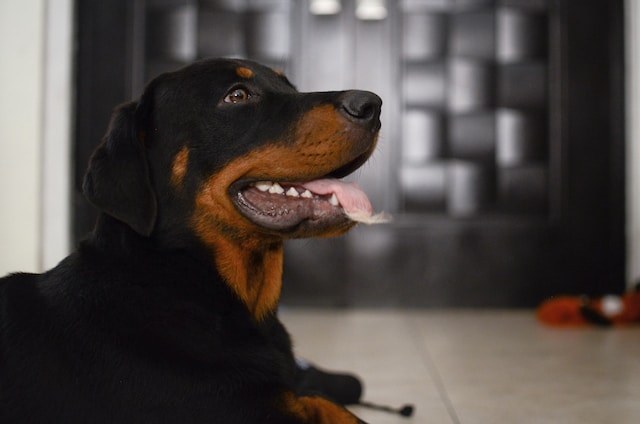Do Rottweilers Growl When Happy – Rottweiler Behavior

Picture this: you’ve just brought home your adorable Rottweiler pup, and you’re over the moon with happiness. But as your furry companion lets out a deep, rumbling growl, you can’t help but wonder,
‘Do Rottweilers Growl When Happy?’ If you’ve found yourself pondering this canine conundrum, you’re not alone.
Let’s unlock the secret language of Rottweilers and explore whether that growl is a joyful serenade or a warning call.
Introduction
Rottweilers, known for their strong and imposing appearance, have a unique way of expressing themselves. While growling is often associated with aggression, Rottweilers can also growl when they are happy. In this article, we’ll explore this intriguing aspect of their behavior and help you distinguish between a happy growl and an aggressive one. Let’s dive in!
The Complexity of Rottweiler Vocalizations
Understanding Rottweiler behavior is a fascinating journey into the world of canine communication. These loyal and protective dogs often use growling as a means of expressing their emotions, whether it’s happiness or protectiveness.
The Happy Growl
When a Rottweiler is happy, their growl takes on a distinct character. It’s typically low and rumbling, almost like a contented purr. This type of growl is often accompanied by other signs of happiness, such as:
Wagging Tail: One of the most telling signs of a happy Rottweiler is a vigorously wagging tail. It’s a clear indicator that the dog is in a positive emotional state.
Licking: Happy Rottweilers may also engage in gentle licking, which is a sign of affection and contentment.
Playful Behavior: These dogs are known for their playful nature. When they’re happy, they might engage in playful antics, like bouncing around or inviting you to play with them.
The Aggressive Growl
On the flip side, an aggressive growl from a Rottweiler sounds starkly different from a happy one. It tends to be high-pitched and sharp, carrying a sense of warning or threat. Along with the growl, aggressive Rottweilers may display the following signs:
Bared Teeth: A Rottweiler showing its teeth is a clear signal of aggression. This is often accompanied by a raised lip and exposed canines.
Stiff Body Posture: Aggressive Rottweilers adopt a stiff and rigid body posture. They might stand tall, with their weight forward, ready to defend their territory or themselves.
Narrowed Eyes: The eyes of an aggressive Rottweiler are usually focused and narrowed, indicating a heightened state of alertness.
Context Matters
Distinguishing between a happy growl and an aggressive growl is not solely about the sound; context plays a crucial role.
Contextual Clues
If a Rottweiler is growling in a situation where happiness is likely, such as during playtime or when greeting a familiar person, it’s more probable that the growl is a sign of joy. On the other hand, if the dog is growling in a context where it feels threatened, such as when guarding its food or territory, it’s more likely an aggressive expression.
Handling a Rottweiler’s Growl
If you’re ever unsure whether a Rottweiler’s growl is a happy or aggressive one, it’s essential to prioritize safety:
Give Space: Regardless of the reason behind the growl, it’s wise to give the dog some space. This allows it to relax and reduces the chances of a misunderstanding.
Distraction: Try distracting the Rottweiler with a favorite toy or treat. A happy Rottweiler will often be easily diverted from its growling, while an aggressive one may remain fixated.
Professional Help: If the growling persists or if you suspect aggression, it’s crucial to consult a qualified professional. An experienced dog behaviorist or trainer can assess the situation and provide guidance.
Rottweiler Growling: Understanding the Triggers
Rottweilers are responsive animals, and their growling can be triggered by various factors. It’s essential to delve deeper into what might prompt these vocalizations to ensure a harmonious relationship with your furry friend.
Common Triggers for Rottweiler Growling
Territorial Instincts: Rottweilers are known for their protective nature. They may growl when they perceive a threat to their territory, which could be your home or even your personal space during a walk.
Fear and Anxiety: Like all dogs, Rottweilers can experience fear and anxiety. Growling can be a way for them to communicate their discomfort in stressful situations.
Pain or Discomfort: When a Rottweiler is in pain or feeling unwell, they may growl as a way to signal their distress. This can serve as a warning for you to seek medical attention for your pet.
Resource Guarding: Rottweilers may growl when they feel the need to protect their possessions, such as food, toys, or even their favorite spot on the couch.
Understanding the specific triggers for your Rottweiler’s growling can help you address the root causes and work on preventing or minimizing these responses.
Training Techniques for Rottweiler Growling
While it’s natural for Rottweilers to growl on occasion, excessive or aggressive growling can be concerning. Proper training is essential to ensure that your Rottweiler expresses themselves appropriately. Here, we’ll explore effective techniques for managing and modifying growling behavior.
Steps to Address Growling Through Positive Reinforcement
Identify Triggers: Observe your Rottweiler’s behavior and identify the specific triggers that lead to growling.
Desensitization: Gradually expose your Rottweiler to the triggers in a controlled and positive manner. For example, if your dog growls when approached by strangers, introduce them to friendly strangers one at a time, rewarding calm behavior.
Reward Good Behavior: Whenever your Rottweiler responds calmly to a trigger without growling, reward them with treats, praise, and affection. This reinforces the desired behavior.
Redirect Attention: When you notice signs that your Rottweiler might start growling, redirect their attention to a toy or a command they know well, like “sit” or “stay.”
Consistency: Be consistent in your training efforts. Ensure that everyone in your household follows the same training techniques to avoid confusion.
Professional Assistance: If your Rottweiler’s growling behavior is persistent or severe, consider seeking help from a professional dog trainer or behaviorist. They can provide specialized guidance tailored to your dog’s needs.
Remember, patience and consistency are key when training your Rottweiler. Positive reinforcement, combined with understanding their triggers, can help create a more harmonious and well-behaved companion.
Conclusion
Do Rottweilers Growl When Happy? The answer is Rottweilers can indeed growl when they are happy. However, distinguishing between a happy growl and an aggressive one relies on various factors, including tone, body language, and context. To ensure everyone’s safety, always err on the side of caution when interpreting a Rottweiler’s growling.
Feel free to embrace and enjoy the unique vocalizations of these remarkable dogs, but remember that responsible ownership involves understanding and respecting their communication style.




